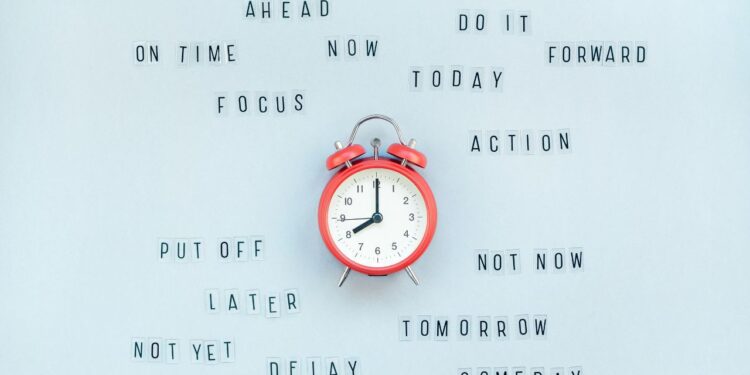- Procrastination crushes career outlooks because it hurts personal growth, mental well-being, and your personal productivity.
- Some people feel they are more productive on a shorter deadline, but that’s because they are forced to produce work faster out of necessity.
- Over time, frustration can strain professional relationships and limit future opportunities to collaborate.
Are you tired of making excuses to coworkers? Or losing sleep in a frantic rush to complete a project that’s due in the morning? There are a lot of pitfalls when it comes to procrastination, not the least of which is sabotaging your own career.
There’s not really any way around it: In today’s flexible, distributed, and fast-paced professional work environments, taking charge of time on the clock and overcoming procrastination can make the difference between failure and success.
While you may have made efforts to stop procrastinating in the past, kicking the bad habit requires more than shame as a motivation. Understanding the impact of procrastination on your career development and mental health can help you end procrastination for good.
What is Procrastination?
According to dictionary.com, procrastination is “the act or habit of procrastinating, or putting off or delaying, especially something requiring immediate attention.”
In other words, someone who procrastinates is delaying tasks despite knowing that it might have negative consequences. While it is a commonly known habit that could negatively affect many aspects of an individual’s life, when it comes to professional careers, procrastination can severely impact one’s success.
Procrastination crushes career outlooks because it can hurt personal growth, mental well-being, and your personal productivity — and there is a lot of research to back this up.
One research paper published in Frontiers in Psychology, a peer-reviewed academic journal, has suggested that procrastination in the workplace may be associated with factors such as “professional role ambiguity, abusive supervision, workplace ostracism, and task characteristics.”
It could also be that your return-to-office mandate is leading you to more distractions, thus projects and tasks are being pushed back. According to a recent study conducted by Hubstaff, remote team members, on average, spend 59.48% of their work week in focused time — compared to 48.5% for in-office team members.
In terms of daily focus time, Hubstaff’s data revealed that remote workers average about 273 minutes (or 4.55 hours), while in-office workers average 223 minutes (or 3.72 hours). So overall, remote workers have approximately 22.75 hours of focused time per week, compared to 18.6 hours for in-office workers. This marks a 22% increase in focused time.
This tech can add to the severity of procrastination by creating temptations that divert attention from actual work-related tasks.
Moreover, the workforce is increasingly surrounded by information and communication technology, which has introduced a whole new list of distractions for professionals to manage. This tech can add to the severity of procrastination by creating temptations that divert attention from actual work-related tasks.
These findings suggest that both personal and workplace factors contribute to procrastination at work. This shows the true complexity of fully addressing this issue in a professional setting.
How does procrastination hurt professional growth in the workplace?
1.Missing out on opportunities
One of the major side effects of procrastination is missing out on opportunities in the workplace. This is a nightmare for people who may have a fear of missing out (FOMO), and it could lead to developing psychological and health issues.
Missed opportunities not only come at a cost to you, but also to the company you work for. Procrastination can lead to missing important networking events, emails, phone calls, a new project assignment, and also missing important project deadlines — which can mean you won’t get another shot at an important project.
Losing out on these kinds of opportunities can result in delayed or limited offers for promotions.
Career-focused individuals should be prompt in responding to opportunities, communications, and new ideas. Doing so could take away some of the added stress and make a difference between success and failure at work.
2.Impaired Performance
There’s a concept known among economists called Parkinson’s Law, named after Cyril Northcote Parkinson, who wrote in an essay published in The Economist in 1955, “work expands so as to fill the time available for its completion.”
Some people feel they are more productive on a shorter deadline, but that’s because they are forced to produce work faster out of necessity.
However, the performance is usually not up to par with someone who has stretched out the task over a longer period of time.
As deadlines approach, pressure to address the put-off task adds to an individual’s stress and it can lower the quality of work produced — eventually affecting professional credibility.
Like Parkinson’s law suggests, procrastination leads to rushing tasks at the last minute, which can increase the likelihood of mistakes.
As deadlines approach, pressure to address the put-off task adds to an individual’s stress and it can lower the quality of work produced — eventually affecting professional credibility.
Impaired performance also prevents individuals from putting forth their best efforts and showcasing their full potential.
3.Reduced Productivity
The founder of IKEA, Ingvar Kamprad is quoted as saying, “You can do so much in 10 minutes time. Ten minutes, once gone, are gone for good. Divide your life into 10-minute units and sacrifice as few of them as possible in meaningless activity.”
Productivity is about structured routines, eliminating distractions and setting clear goals.
It’s good advice for someone who wants to be productive, but for a procrastinator this mantra is not one that they follow. Productivity is about structured routines, eliminating distractions and setting clear goals.
When procrastination becomes a habit, productivity inevitably suffers. Much like Parkinson’s law, consistently pushing tasks until the last minute can create a backlog of unfinished work and the end product will obviously reflect ineffective time management.
In an age where workplaces are obsessed with ways to boost productivity, making a habit out of ways to be less efficient and productive will negatively hurt one’s career.
To quote the famous physicist and professor Albert Einstein, “Strive not to be a success, but rather to be of value.” Eventually good habits, like dedicating time to have hyper-focused work with no distractions or picking at projects over the course of an assigned time period — not at the last minute — are just little habits that go a long way.
4.Strained Work Relationships
The consequences of procrastination are not limited to direct impacts such as decreased productivity and delayed career advancement.
Other consequences, although less clear, could include strained professional relationships and relationships with work — which further damages an individual’s ability to succeed.
Over time, this frustration can strain professional relationships and limit future opportunities to collaborate.
Last year, Hewlett Packard published its “Work Relationship Index,” a study that explored employees’ relationship with work around the world. The data reveals that “just 27% of knowledge workers have a healthy relationship with work.”
However, procrastination can cause frustration among team members who rely on a timely work ethic. Over time, this frustration can strain professional relationships and limit future opportunities to collaborate. In the worst-case scenario, procrastination may lead to being overlooked for leadership roles or team-based assignments.
Despite these challenges, research on how to mitigate the adverse outcomes of procrastination, especially in varied professional contexts, remains somewhat limited.
A report published by Harvard Business Review Review reviewed around 300 studies published in management and psychology in the last 15 years that related to workplace relationships, relationship transgressions, and relationship repair. What the authors suggest is:
- Reset the emotional tone: Address tension openly, emphasize positive aspects, and take a break, if needed, to maintain a supportive environment.
- Craft a shared narrative: Develop a mutual understanding of conflicts by sharing perspectives and focusing on the relationship rather than individual blame.
- Build Relational Agility: Anticipate challenges, respond creatively to surprises, and seek understanding to improve interaction and solve problems together.
5.Stress and Health Implications
From a mood regulation perspective of procrastination, distractions provide opportunities for procrastination but are not its core cause.
Procrastination can create a never ending cycle of stress, guilt, and anxiety as deadlines approach. This is especially true for remote or hybrid workers.
“It might be expected that procrastination would increase under remote working conditions because of the increased availability of distractions,” according to a journal article on procrastination and stress. “Indeed, many working environments are structured and include dedicated working space that is set up to promote focus and reduce unnecessary distractions. From a mood regulation perspective of procrastination, distractions provide opportunities for procrastination but are not its core cause. Instead, the lack of structure in remote working situations and uncertainty from working under new conditions are conditions that can generate stress, and in turn trigger procrastination as a means of coping with that stress.”
Stress can also take a toll on one’s mental and physical health, affecting an individual’s overall well-being and their ability to perform effectively in the workplace.
Other factors including financial insecurity and social isolation can also add stress for an individual and thus, contribute to procrastination. Finding ways to cultivate self-compassion and a positive mindset can be a good coping resource to reduce stress.
How to Stop Procrastinating
It’s obvious that taking back control of your time and overcoming procrastination is a key ingredient for success. What’s not obvious when you’re mired in old habits is how to overcome the behaviors.
Here are a few proven strategies you can implement to overcome procrastination:
1.Break large tasks into smaller, more manageable parts
This is a common strategy to counter procrastination for a reason. There are many free sources online related to how to implement this into your workflow. The concept is to help individuals plan out projects. This can help reduce the feeling of being overwhelmed and make it easier to get started.
2.Set specific, achievable goals
This is another common tactic that goes hand-in-hand with the previous one. After breaking down a project into more manageable parts, set specific goals describing what you want to accomplish within each part.
3.Change your environment
Perhaps a change of scenery is the way to become more focused on upcoming projects. For hybrid and flexible workers, there are libraries, cafes, hotels, parks, and coworking centers that could help get you back on task.
For fully in-office workers, take out time for a day trip or a weekend trip and clear your mind. You’ll be surprised how much that can benefit you.
4.Practice self-compassion
Believing in yourself as you strive towards your goals is probably the most important step to tackling procrastination.
Mindset is key. Believing in yourself as you strive towards your goals is probably the most important step to tackling procrastination. It starts with a positive attitude and self-compassion.
Ultimately, addressing the underlying causes of procrastination and adopting productive habits will set individuals up for long-term career success.


 Dr. Gleb Tsipursky – The Office Whisperer
Dr. Gleb Tsipursky – The Office Whisperer Nirit Cohen – WorkFutures
Nirit Cohen – WorkFutures Angela Howard – Culture Expert
Angela Howard – Culture Expert Drew Jones – Design & Innovation
Drew Jones – Design & Innovation Jonathan Price – CRE & Flex Expert
Jonathan Price – CRE & Flex Expert














